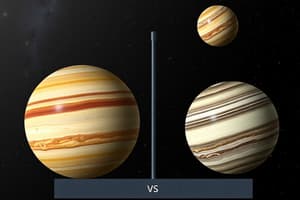Podcast
Questions and Answers
What causes air resistance on an object in motion?
What causes air resistance on an object in motion?
- The gravitational attraction of nearby objects
- The temperature of the air surrounding the object
- The speed at which the object is traveling through water
- Friction between the object's motion and air particles (correct)
What happens when the force of air resistance equals the weight of a falling object?
What happens when the force of air resistance equals the weight of a falling object?
- The object continues to fall at a steady (terminal) speed (correct)
- The object experiences no force acting on it
- The object accelerates downward indefinitely
- The object rises back to its original height
Which statement accurately describes the weight force of an object?
Which statement accurately describes the weight force of an object?
- It is influenced by the object's shape and size
- It is the product of the object's mass and the gravitational field strength (correct)
- It is unrelated to the gravitational pull of the Earth
- It decreases as the object ascends in the atmosphere
What is the result when an object falls through a uniform gravitational field?
What is the result when an object falls through a uniform gravitational field?
What role does collision with air particles play in the motion of an object?
What role does collision with air particles play in the motion of an object?
What happens to the skydiver when air resistance equals the weight force?
What happens to the skydiver when air resistance equals the weight force?
What causes the skydiver's acceleration to slow when the parachute is opened?
What causes the skydiver's acceleration to slow when the parachute is opened?
Initially, why do skydivers accelerate downwards?
Initially, why do skydivers accelerate downwards?
What occurs to a skydiver after reaching a new slower terminal velocity with the parachute open?
What occurs to a skydiver after reaching a new slower terminal velocity with the parachute open?
What effect does an increase in speed have on the force of friction acting on a falling object?
What effect does an increase in speed have on the force of friction acting on a falling object?
What is the SI unit for mass?
What is the SI unit for mass?
How is weight defined?
How is weight defined?
What does gravitational field strength represent?
What does gravitational field strength represent?
What is the approximate value of acceleration due to gravity near the Earth's surface?
What is the approximate value of acceleration due to gravity near the Earth's surface?
Which statement is true regarding mass and weight?
Which statement is true regarding mass and weight?
What is terminal velocity?
What is terminal velocity?
What effect does mass have on an object moving through a liquid?
What effect does mass have on an object moving through a liquid?
What causes friction (drag) on an object moving through a gas?
What causes friction (drag) on an object moving through a gas?
What is the approximate gravitational field strength near the Earth's surface?
What is the approximate gravitational field strength near the Earth's surface?
What causes an object to heat up as it moves through air?
What causes an object to heat up as it moves through air?
In a vacuum, what determines the acceleration of freefall for all objects?
In a vacuum, what determines the acceleration of freefall for all objects?
What happens to the force of air resistance as the speed of a falling object increases?
What happens to the force of air resistance as the speed of a falling object increases?
Which of the following statements about terminal velocity is accurate?
Which of the following statements about terminal velocity is accurate?
What is drag in the context of motion through fluids?
What is drag in the context of motion through fluids?
Which of the following best describes the motion of a skydiver shortly after jumping from a plane?
Which of the following best describes the motion of a skydiver shortly after jumping from a plane?
How does the gravitational field strength on the Moon compare to that on Earth?
How does the gravitational field strength on the Moon compare to that on Earth?
Study Notes
Mass and Weight
- Mass is a scalar quantity measuring the amount of matter in an object.
- Mass is measured in kilograms (kg).
- Mass resists changes in motion.
- Weight is a vector quantity measuring the gravitational force on an object.
- Weight is measured in Newtons (N).
- The weight of an object depends on its mass and the strength of the gravitational field.
Gravitational Field Strength
- Gravitational field strength (g) is the force per unit mass acting on an object in a gravitational field, measured in N/kg.
- On Earth, the gravitational field strength is approximately 9.81 N/kg, equivalent to the acceleration of free fall.
- The gravitational field strength varies depending on the mass and radius of the celestial body.
Using a Balance
- A balance can be used to compare the weights of two objects.
- Because the gravitational field strength on Earth is constant, a balance can also be used to measure the mass of an object.
Friction in Fluids
- Gases and liquids are known as fluids.
- Friction acts on objects moving through fluids, referred to as drag.
- Air resistance is a type of drag that slows down the motion of an object through air.
Acceleration of Freefall
- In the absence of air resistance, all objects fall with the same acceleration, known as acceleration of freefall (g) or acceleration due to gravity.
- The acceleration of freefall is approximately 9.8 m/s2 near the Earth's surface.
- The acceleration due to gravity increases an object's velocity by 9.8 m/s for every second it falls.
Terminal Velocity
- Objects falling through fluids experience two forces: weight and friction (e.g., air resistance).
- The force of air resistance increases with speed.
- Terminal velocity is the constant speed reached when the force of air resistance equals the weight force, resulting in zero acceleration.
- When a skydiver opens their parachute, the surface area increases, causing increased air resistance and slowing their fall.
- A new, slower terminal velocity is reached when the forces balance out again.
Studying That Suits You
Use AI to generate personalized quizzes and flashcards to suit your learning preferences.
Related Documents
Description
Explore the concepts of mass and weight, and understand the differences between these two quantities. This quiz covers gravitational field strength and how to use a balance to measure mass. Test your knowledge and see how these principles apply in physics.




